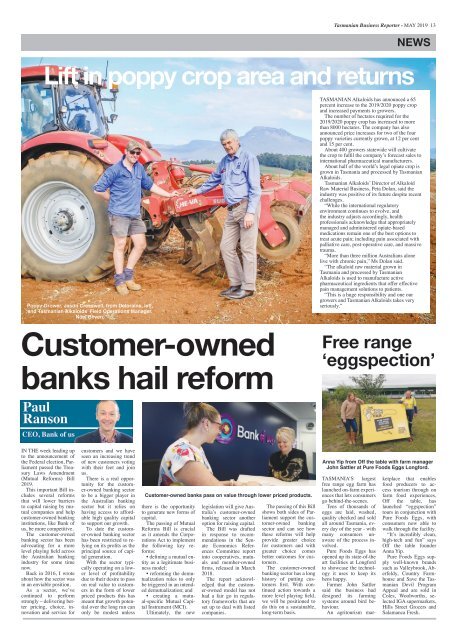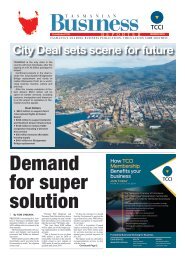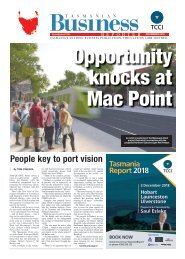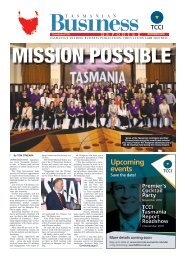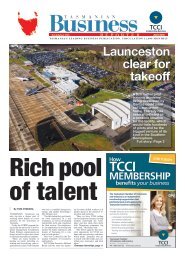Tasmanian Business Reporter May 2019
Welcome to the May edition of the TBR. This month we bring you an in-depth preview into what to expect from the upcoming 2019 State Budget, where record spending is expected to continue in health, education, housing and infrastructure despite significant decreases in stamp duty and GST payments contributing to a hit to State revenue. You'll also find an explanation of the franking credits issue from Tasplan Super CEO Wayne Davy, details of a new WorkSafe Tasmania workplace mental health awareness campaign (click here to watch their video), as well as all the latest business news from across the state.
Welcome to the May edition of the TBR.
This month we bring you an in-depth preview into what to expect from the upcoming 2019 State Budget, where record spending is expected to continue in health, education, housing and infrastructure despite significant decreases in stamp duty and GST payments contributing to a hit to State revenue.
You'll also find an explanation of the franking credits issue from Tasplan Super CEO Wayne Davy, details of a new WorkSafe Tasmania workplace mental health awareness campaign (click here to watch their video), as well as all the latest business news from across the state.
You also want an ePaper? Increase the reach of your titles
YUMPU automatically turns print PDFs into web optimized ePapers that Google loves.
<strong>Tasmanian</strong> <strong>Business</strong> <strong>Reporter</strong> - MAY <strong>2019</strong> 13<br />
NEWS<br />
Lift in poppy crop area and returns<br />
Poppy Grower, Jason Cresswell, from Deloraine, left,<br />
and <strong>Tasmanian</strong> Alkaloids’ Field Operations Manager,<br />
Noel Beven,<br />
Customer-owned<br />
banks hail reform<br />
TASMANIAN Alkaloids has announced a 65<br />
percent increase to the <strong>2019</strong>/2020 poppy crop<br />
and increased payments to growers.<br />
The number of hectares required for the<br />
<strong>2019</strong>/2020 poppy crop has increased to more<br />
than 8000 hectares. The company has also<br />
announced price increases for two of the four<br />
poppy varieties currently grown, at 12 per cent<br />
and 15 per cent.<br />
About 400 growers statewide will cultivate<br />
the crop to fulfil the company’s forecast sales to<br />
international pharmaceutical manufacturers.<br />
About half of the world’s legal opiate crop is<br />
grown in Tasmania and processed by <strong>Tasmanian</strong><br />
Alkaloids.<br />
<strong>Tasmanian</strong> Alkaloids’ Director of Alkaloid<br />
Raw Material <strong>Business</strong>, Peta Dolan, said the<br />
industry was positive of its future despite recent<br />
challenges.<br />
“While the international regulatory<br />
environment continues to evolve, and<br />
the industry adjusts accordingly, health<br />
professionals acknowledge that appropriately<br />
managed and administered opiate-based<br />
medications remain one of the best options to<br />
treat acute pain; including pain associated with<br />
palliative care, post-operative care, and massive<br />
trauma.<br />
“More than three million Australians alone<br />
live with chronic pain,” Ms Dolan said.<br />
“The alkaloid raw material grown in<br />
Tasmania and processed by <strong>Tasmanian</strong><br />
Alkaloids is used to manufacture active<br />
pharmaceutical ingredients that offer effective<br />
pain management solutions to patients.<br />
“This is a huge responsibility and one our<br />
growers and <strong>Tasmanian</strong> Alkaloids takes very<br />
seriously.”<br />
Free range<br />
‘eggspection’<br />
Paul<br />
Ranson<br />
CEO, Bank of us<br />
IN THE week leading up<br />
to the announcement of<br />
the Federal election, Parliament<br />
passed the Treasury<br />
Laws Amendment<br />
(Mutual Reforms) Bill<br />
<strong>2019</strong>.<br />
This important Bill includes<br />
several reforms<br />
that will lower barriers<br />
to capital raising by mutual<br />
companies and help<br />
customer-owned banking<br />
institutions, like Bank of<br />
us, be more competitive.<br />
The customer-owned<br />
banking sector has been<br />
advocating for a more<br />
level playing field across<br />
the Australian banking<br />
industry for some time<br />
now.<br />
Back in 2016, I wrote<br />
about how the sector was<br />
in an enviable position.<br />
As a sector, we’ve<br />
continued to perform<br />
strongly – delivering better<br />
pricing, choice, innovation<br />
and service for<br />
customers and we have<br />
seen an increasing trend<br />
of new customers voting<br />
with their feet and join<br />
us.<br />
There is a real opportunity<br />
for the customer-owned<br />
banking sector<br />
to be a bigger player in<br />
the Australian banking<br />
sector but it relies on<br />
having access to affordable<br />
high quality capital<br />
to support our growth.<br />
To date the customer-owned<br />
banking sector<br />
has been restricted to relying<br />
on its profits as the<br />
principal source of capital<br />
generation.<br />
With the sector typically<br />
operating on a lower<br />
level of profitability<br />
due to their desire to pass<br />
on real value to customers<br />
in the form of lower<br />
priced products this has<br />
meant that growth potential<br />
over the long run can<br />
only be modest unless<br />
Customer-owned banks pass on value through lower priced products.<br />
there is the opportunity<br />
to generate new forms of<br />
capital.<br />
The passing of Mutual<br />
Reforms Bill is crucial<br />
as it amends the Corporations<br />
Act to implement<br />
the following key reforms:<br />
• defining a mutual entity<br />
as a legitimate business<br />
model;<br />
• reforming the demutualization<br />
rules to only<br />
be triggered in an intended<br />
demutualization; and<br />
• creating a mutual-specific<br />
Mutual Capital<br />
Instrument (MCI).<br />
Ultimately, the new<br />
legislation will give Australia’s<br />
customer-owned<br />
banking sector another<br />
option for raising capital.<br />
The Bill was drafted<br />
in response to recommendations<br />
in the Senate<br />
Economics References<br />
Committee report<br />
into cooperatives, mutuals<br />
and member-owned<br />
firms, released in March<br />
2018.<br />
The report acknowledged<br />
that the customer-owned<br />
model has not<br />
had a fair go in regulatory<br />
frameworks that are<br />
set up to deal with listed<br />
companies.<br />
The passing of this Bill<br />
shows both sides of Parliament<br />
support the customer-owned<br />
banking<br />
sector and can see how<br />
these reforms will help<br />
provide greater choice<br />
for customers and with<br />
greater choice comes<br />
better outcomes for customers.<br />
The customer-owned<br />
banking sector has a long<br />
history of putting customers<br />
first. With continued<br />
action towards a<br />
more level playing field,<br />
we will be positioned to<br />
do this on a sustainable,<br />
long-term basis.<br />
Anna Yip from Off the table with farm manager<br />
John Sattler at Pure Foods Eggs Longford.<br />
TASMANIA’S largest<br />
free range egg farm has<br />
launched on-farm experiences<br />
that lets consumers<br />
go behind-the-scenes.<br />
Tens of thousands of<br />
eggs are laid, washed,<br />
quality checked and sold<br />
all around Tasmania, every<br />
day of the year - with<br />
many consumers unaware<br />
of the process involved.<br />
Pure Foods Eggs has<br />
opened up its state-of-the<br />
art facilities at Longford<br />
to showcase the technology<br />
it uses to keep its<br />
hens happy.<br />
Farmer John Sattler<br />
said the business had<br />
designed its farming<br />
systems around bird behaviour.<br />
An agritourism marketplace<br />
that enables<br />
food producers to access<br />
tourism through on<br />
farm food experiences,<br />
Off the table, has<br />
launched “eggspection”<br />
tours in conjunction with<br />
Pure Foods Eggs, with<br />
consumers now able to<br />
walk through the facility.<br />
“It’s incredibly clean,<br />
high-tech and fun” says<br />
Off the table founder<br />
Anna Yip.<br />
Pure Foods Eggs supply<br />
well-known brands<br />
such as Valleybrook, Aberfeldy,<br />
Country Farmhouse<br />
and Save the <strong>Tasmanian</strong><br />
Devil Program<br />
Appeal and are sold in<br />
Coles, Woolworths, selected<br />
IGA supermarkets,<br />
Hills Street Grocers and<br />
Salamanca Fresh.


